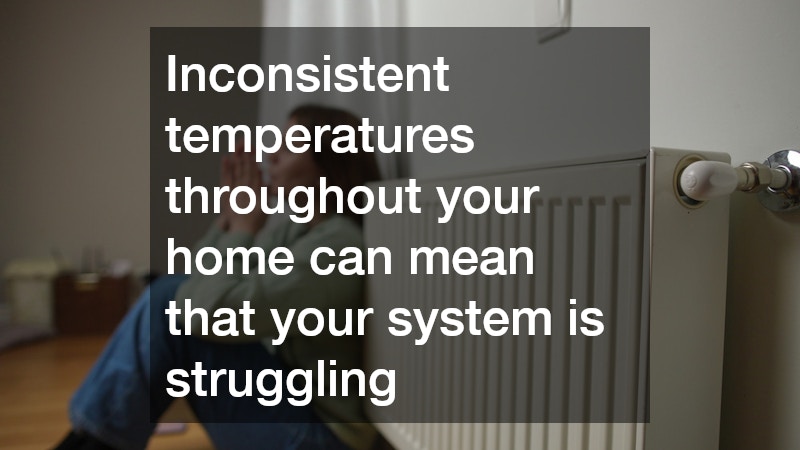Explore essential insights from heating contractors regarding your HVAC system. Understanding these aspects can help you maintain a comfortable and efficient home environment.
The Right Time to Schedule HVAC Maintenance
Regular maintenance is crucial to ensure your HVAC system operates efficiently. Heating contractors recommend scheduling inspections at least once or twice a year, depending on your system’s type.
This preventive maintenance can significantly improve performance and prolong the lifespan of your system.
During regular inspections, technicians will check for any potential issues that could lead to system failures. Furthermore, regular maintenance often includes cleaning components such as coils and filters, which can enhance efficiency. Homeowners should take note of their HVAC system’s performance seasonally, noting any changes that may warrant a review.
Many homeowners fail to realize the importance of consistent maintenance, often overlooking it until a problem arises. By prioritizing routine checks, individuals can save money in the long run by avoiding costly breakdowns and repairs. Ensuring your HVAC system gets the attention it needs can make a significant difference in comfort and energy efficiency.
The Signs That Your HVAC System Needs Repairs
Common indicators of HVAC issues include unusual noises, inconsistent temperatures, and increased energy bills. Early detection of these signs can prevent costly repairs. Homeowners should familiarize themselves with the typical sounds and performance of their systems to notice any irregularities quickly.
If your HVAC system begins to produce unfamiliar sounds like clanging, hissing, or grinding, it may indicate a mechanical issue that needs immediate attention. Inconsistent temperatures throughout your home can mean that your system is struggling to distribute air correctly, possibly due to airflow problems or thermostat issues. Tracking energy bills that rise without an increase in usage can point to an inefficient system requiring inspection.
Addressing these issues promptly can prevent minor problems from escalating into major malfunctions. By staying vigilant and proactive, homeowners can not only maintain comfort levels but also enhance the overall efficiency of their HVAC systems. It’s important to remember that neglecting these signs can lead to more extensive and expensive repairs down the line.
The Right Way to Improve HVAC Efficiency
Improving efficiency can be achieved through regular maintenance, changing filters, and upgrading to energy-efficient models. These steps not only save money but also extend your system’s lifespan. Regular maintenance helps keep the system clean and functioning optimally, while new technology in HVAC systems offers better energy consumption rates.
Changing filters regularly is a simple yet effective way to improve airflow and efficiency in your HVAC system. Homeowners should check their filters every month and replace them when they appear dirty, as clean filters are key to maintaining air quality and system efficiency. Furthermore, considering energy-efficient models during replacements can greatly reduce energy costs and environmental impact.
Investing in programmable thermostats and zoning systems can further enhance HVAC efficiency. These options allow for better control over temperatures in different areas of the home, reducing energy waste. Understanding these methods and implementing them can lead to a more efficient HVAC system that keeps your energy costs in check.
The Details to Look for in an HVAC Contractor
When selecting an HVAC contractor, consider their credentials, customer reviews, and experience level. It’s important to choose someone you can trust for reliable service. The right contractor should have proper licenses and insurance, along with a good reputation in the community.
Looking at online reviews and asking for recommendations can help narrow down options for potential contractors. It is also advisable to check their track record in handling similar HVAC systems and the range of services they offer. A contractor with years of experience often has the skills necessary to troubleshoot and resolve issues effectively.
Furthermore, communication is key when working with an HVAC contractor. Ensure that they are transparent in their pricing and explain the services provided clearly. Ultimately, choosing the right contractor can make a significant difference in the maintenance and repair of your HVAC system.
The Signs You Need to Replace Your HVAC System
Indicators for replacement can include frequent breakdowns, older system age, and rising utility bills. A thorough evaluation by a contractor can help determine the best course of action. If your HVAC system is more than 10-15 years old, it may be time to consider an upgrade.
Frequent repairs can add up quickly, and it may be more cost-effective to replace an unreliable system rather than continue investing in repairs. Homeowners should also note if they’re facing fluctuations in temperature or reduced airflow, as these could signal that their systems are no longer functioning efficiently. Rising utility bills without any change in usage patterns are another major red flag.
Understanding what heating contractors want you to know about your HVAC system can help you make informed decisions. Regular maintenance, attention to signs of trouble, and working with a trusted contractor are essential for the longevity and efficiency of your system. Taking proactive steps can ensure that your home remains comfortable and your energy costs stay manageable.



